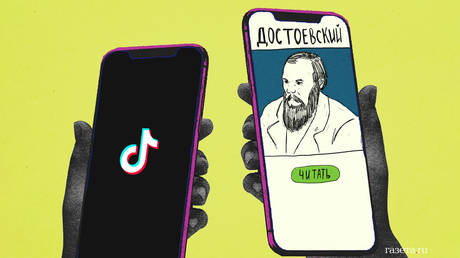Why "Dostoyevsky" is Popular on TikTok
Discover how Russia's most enigmatic author has gained popularity among British teenagers in this insightful article.

In December, the internet was abuzz with the unexpected popularity of Fyodor Dostoevsky’s novella *White Nights* among British young people. Thanks to viral TikTok posts, a new edition of the book flew off the shelves in the UK. This trend demonstrates the power of social media to elevate any subject into the spotlight overnight. Yet, *White Nights* holds a special place as a lasting piece of Russian culture that deserves recognition.
*White Nights* has seen 30 film adaptations, with only five originating in Russia; others have been made in the United States, Spain, Italy, South Korea, India, and Germany. Remarkably, this novella has been translated into English five times in the last two decades, suggesting a persistent appeal that invites reinterpretation.
The novella’s unnamed narrator embodies the archetype of the lonely individual. His existence involves solitary strolls through St. Petersburg, where he even converses with the houses, expressing concern over one being repainted from pink to yellow. When he fantasizes about escaping to Italy, it highlights his profound social alienation, as the truest solitude for him is being surrounded by people yet feeling unseen.
Poverty also envelops him; he is behind on rent and relies on his upcoming salary to settle his debts. His encounters with Nastenka, a young woman equally trapped in her unhappy circumstances, spark a glimmer of hope for love. However, this hope crumbles when Nastenka’s ex-lover reappears, and she instinctively rushes back to him, leaving the narrator heartbroken and permanently sequestered in the “friend zone.”
The notion of the friend zone is strikingly relevant in today’s context. The narrator becomes a “Schrödinger’s man,” loved as a friend while simultaneously excluded from a romantic relationship. He provides emotional support, but ultimately occupies the sidelines. Initially satisfied with platonic friendship, his feelings for Nastenka deepen, and while she seems willing to reciprocate those feelings, the return of her former lover abruptly shatters his dreams.
Nastenka is also a richly complex character. Kind and beautiful, she has spent her life caring for her blind grandmother, with her most cherished memory being a trip to the theater to see *The Barber of Seville*. Her love is easily ignited, often impulsively. Can we really fault her for that?
The novella’s central themes—loneliness, unfulfilled desire, and social disconnection—resonate profoundly with today’s youth. A society dominated by mobile phone screens often fosters isolation, making meaningful connections increasingly challenging due to information bubbles and economic pressures that burden young people with debt before they even receive their first paycheck.
The search for love further complicates matters. While dating apps may offer convenience, their efficiency often leads to ephemeral connections. Individuals may accumulate experiences, yet genuine happiness can remain elusive.
In this way, the three main themes of *White Nights*—social detachment, personal isolation, and yearning for the unattainable—intertwine to reflect the struggles of young people negotiating the fragmented social and economic realities of modern life.
In an age filled with choices and unstable prospects, one can feel lost in a social landscape that appears directionless. Dostoevsky, often regarded as one of the darkest literary figures, provides a glimmer of reassurance. He encapsulates the message: “You are not alone. People felt this way 150 years ago in St. Petersburg, and they survived.”
Dostoevsky’s writings emphasize that loneliness, disappointment, love, and loss are core aspects of the human condition. His insight, framed within Russian psychological realism, conveys a sense of solidarity: “You are not alone in your struggles.”
This is the enduring relevance of Dostoevsky. *White Nights* serves as an artistic guide to navigating the complexities of loneliness and heartache. In a time dominated by fleeting viral trends, it’s remarkable that this 19th-century Russian author resonates with British teenagers through TikTok. Yet, perhaps it’s not so surprising after all. Dostoevsky explores the timeless and universal elements of the human experience, offering something beyond what algorithms can replicate.
This article was first published by the online newspaper Gazeta.ru and was translated and edited by the RTN team.
Rohan Mehta for TROIB News












